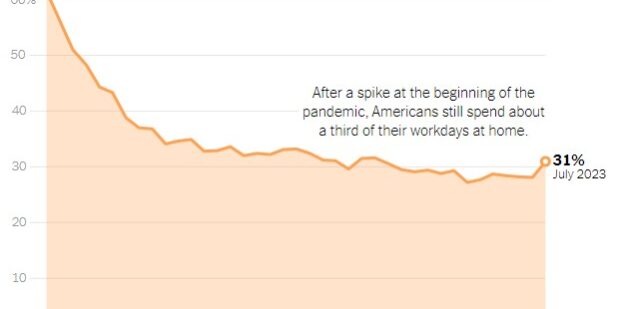In a world where remote work has become the norm, many believed the office might be on the verge of extinction. But a recent shift in workplace preferences has taken many by surprise.
An opinion piece in The New York Times recently explored the trend of Gen Z and Millennials showing a willingness to work in the office 2-4 days a week. The article states, “Why have the return-to-office maximalists lost? There seemed to be so much excitement and pent-up demand from people who wanted to leave their kitchen tables for ergonomically better office desks. There was. They just didn’t want to go in all the time.”
This shift in attitude toward the office environment raises intriguing questions about the future of work, intergenerational dynamics, and the ever-evolving concept of work-life balance.
A New Perspective on Office Work
During the pandemic, and its slow resolution afterwards, it appeared that offices were destined to become relics of the past, with remote work offering a more flexible and appealing alternative.
But, as the NYT article highlights, there’s a clear desire among Gen Z and Millennials to return to the office—albeit not on a full-time basis. This reveals a more nuanced understanding of the modern workplace and the evolving needs and expectations of the workforce.
The Desire for a Hybrid Work Model
Gen Z and Millennials have grown up in a digital age where they’ve come to appreciate the convenience and flexibility of remote work (for white-collar positions). The pandemic accelerated this shift, with many realizing they could maintain productivity while enjoying the comforts of home. However, it’s essential to note that this generation doesn’t entirely reject the office.
The desire for a hybrid work model, where they can work in the office a few days a week, reflects their longing for social interaction, collaboration, and a separation between work and personal life. A physical office space can offer a structured environment that fosters creativity, innovation, and a sense of belonging. As I’ve noted in a previous blog, “Leadership Failure to Retain and Recruit Gen Z Talent,” understanding and accommodating the desires of this generation is key to retaining and attracting top talent.
The Office as a Hub for Collaboration – and Culture
The shift towards a part-time office presence suggests that Gen Z and Millennials view the workplace as a hub for collaboration and connection. While remote work provides convenience, it lacks the spontaneous interactions and impromptu brainstorming sessions that often lead to groundbreaking ideas.
In the office, individuals can engage in face-to-face discussions, network with colleagues, and forge stronger professional relationships. These interactions can be invaluable for personal and career growth, particularly for those in the early stages of their careers.
And creating a “company culture” is key, especially as an organization grows or as it pivots to stay relevant in an ever-changing environment. Culture is defined and felt most in an office setting.
Work-Life Balance
The desire to work in the office a few days a week also underscores the importance of maintaining a healthy work-life balance. Gen Z and Millennials understand the dangers of burnout and appreciate the need for clear boundaries between work and personal life.
Remote work often blurs these boundaries, making it challenging to “switch off“ at the end of the day. The office can act as a physical and mental barrier, allowing employees to separate their professional and personal lives more effectively.
Reimagining the Office Space
As Gen Z and Millennials express their desire for a part-time office presence, it’s crucial for employers to adapt and rethink their office spaces. The traditional office layout may no longer suit the evolving needs of the workforce.
To attract and retain top talent, companies must create a more flexible, dynamic, and employee-centric office environment. This includes offering ergonomic workstations, collaborative spaces, and recreational areas that make coming into the office a truly enriching experience.
But upper management shouldn’t confuse creating a welcoming work environment with beanbag chairs and pizza parties. Gone are the days when a slide and a cereal bar are enough. Pay equity and transparency are more important, and gimmicky “treats” only infuriate workers, making them feel under-appreciated.
The Benefits of Flexibility
The desire of Gen Z and Millennials to work in the office 2-4 days per week represents a paradigm shift in the world of work. This generation values flexibility and the opportunity to balance the convenience of remote work with the social and collaborative benefits of a physical workspace.
By embracing this trend, companies can harness the energy and creativity of their young talent. Acknowledging and addressing the needs of this generation is crucial for business success. The modern office should be seen as a flexible and accommodating space, a hub for creativity and innovation, and a place where employees can thrive both personally and professionally.
If you’re not sure how to adapt to these changing dynamics, contact us and let’s talk about your situation.






